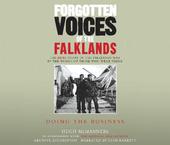
|
Forgotten Voices of the Falklands Part 3: Doing the Business
CD-Audio
Main Details
Description
The latest in the landmark Forgotten Voices series, giving a unique perspective on a pivotal but often overlooked conflict - the Falklands War. The Falklands War was a turning point in modern British history. On the one hand, it was what some considered to be the 'last of the great Elizabethan adventures', with the Royal Navy pulling off an incredible feat of maritime warfare, under the most appallingly risky circumstances. On the other hand, it was the first war of the modern age, using satellite surveillance, computer-driven missiles, night observation devices, and the very latest in modern weaponry. It was also a conflict that could so easily have gone terribly wrong for British forces. Instead, it was a resounding military success.And yet, the conflict's significance is often overlooked. Drawing upon the vast resources of the Imperial War Museum's sound archive, which contains thousands of interviews with both soldiers and civilians, both British and Argentinean, FORGOTTEN VOICES OF THE FALKLANDS WAR redresses the balance, presenting the first complete oral history of the Falklands War. From the initial invasion of the islands to the British offensive to the Argentinean surrender and its aftermath, the audiobook is a unique and essential chronicle of the conflict from all sides and perspectives, told in the participants' own voices. It includes the visceral and often terrifying experiences of the combatants as well as the poignant and sometimes surreal recollections of the islanders caught in the middle.Utilising all the qualities that have made the Forgotten Voices series so popular, Hugh McManners, who himself fought in the Falklands War and witnessed its brutality first-hand, has created the definitive audiobook on the subject.
Author Biography
Hugh McManners was a captain in 148 Commando Forward Observation Battery, serving with the Special Boat Squadron during the Falklands War. He joined the British Army in 1972 and in 1975 was sponsored by them to read Geography at Oxford University. He subsequently spent thirteen years with 3 Commando Brigade before leaving the army in 1989. He is now a television documentary producer, freelance writer and editor of Command magazine.
ReviewsHearing those involved talk about the 1982 conflict conjures up images more vivid than any photograph. * The Times *
|